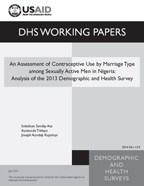
Abstract:
Lowering fertility levels and improving
maternal and child health in sub-Saharan
Africa has been a policy objective for
decades. Most efforts have focused on women,
with little or no involvement of men. The
type of marriage, however, has rarely been
considered as a possible factor that could
influence contraceptive use, and therefore
could have an effect on fertility and
reproductive health. This study thus assesses
contraceptive use by sexually active men
among three marriage types—singles,
polygamous, and monogamous. The study was
based on data on sexually active men age 15-
49 sampled in the 2013 Nigeria Demographic
and Health Survey (NDHS). The study showed
that, overall, 30% of the sampled population
were currently using contraception, with
condom use as the dominant method (66%). The
level of contraceptive use was significantly
higher among sexually active single men, at
68%, compared with 19% among monogamous
married men and 9% among polygamous men.
Other factors influencing contraceptive use
among sexually active men included wealth
status, educational attainment, ethnicity,
region, religion, and age. The study
concluded that in view of the wide variation
in contraceptive use by marriage type in
Nigeria, efforts to increase contraceptive
prevalence should give more consideration to
policies and programs that promote consistent
use of contraceptives particularly among
married men.
 An Assessment of Contraceptive Use by Marriage Type among Sexually Active Men in Nigeria: Analysis of the 2013 Demographic and Health Survey (PDF, 721K)
An Assessment of Contraceptive Use by Marriage Type among Sexually Active Men in Nigeria: Analysis of the 2013 Demographic and Health Survey (PDF, 721K)
